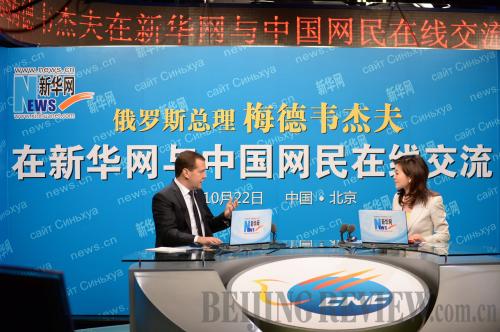|
 |
|
CASUAL EXCHANGE: Visiting Russian Prime Minister Dmitry Medvedev attends an online chat session with Chinese netizens in Beijing on October 22 (CHEN YEHUA) |
Sharing opportunities
Observers believe that boosting bilateral trade and investment is expected to change the current status of China-Russia cooperation, which is described as "hot politics, cool economy."
During Xi's visit in March, the two countries agreed to boost their annual trade volume to $100 billion by 2015 and $200 billion by 2020. The Chinese premier expressed confidence that the two countries will fulfill the first trade target in 2015. His Russian counterpart Medvedev echoed later that day during an online chat with Chinese netizens that the $100 billion goal is not the maximum. "We can even reach $150 billion, $200 billion or more," he said. According to the latest statistics, bilateral trade reached $66.1 billion in the past nine months. China has been Russia's biggest trade partner since 2011.
Li Dong from the CICIR pointed out that trade is a current priority of China-Russia cooperation. "Bilateral trade development has leapt forward," he said. "Growing energy cooperation is the guarantee of future boost of trade. Furthermore, as the two sides agreed during the meeting, innovation, agriculture and science and technology will be the highlight of upcoming cooperation."
Energy cooperation protruded in Medvedev's visit. "Energy cooperation between China and a third party will not affect cooperation between China and Russia," Premier Li told the press after their meeting, adding that the Sino-Russian energy cooperation is of long-term strategic significance.
According to documents signed, a Russian petroleum company will supply an extra 10 million tons of crude oil, valuing $85 billion, to China every year. Moreover, the countries reached a basic understanding on pricing natural gas that Russia will transport to China through pipelines. Their energy cooperation broke the bottleneck of traditional resource supply with the planned launch of a hi-tech joint oil refinery project in Tianjin, which will process 16 million tons of crude oil every year.
Li Dong noted that agriculture will offer big potential for bilateral cooperation. He said that Russia plans to become a major food exporter in the future to ensure its food security. To China, protecting world food security is also a key issue. He suggested boosting investment to promote bilateral cooperation. China is Russia's fourth largest investor, and Russia is China's 12th.
China and Russia also agreed to expand cultural exchanges. The two countries should stick to the ideal of good-neighborly friendship and mutual support and increase experience sharing on state governance in pursuit of common prosperity and the welfare of the people, Chinese President Xi said to Medvedev.
During the meeting, the two premiers approved an inventory of activities of the China-Russia Youth Year of Friendship Exchanges in 2014-15. China and Russia will send 10,000 students to each other as part of the event, which was agreed upon by Xi and Putin during Xi's visit to Russia in March.
Since 2006, the two countries have held reciprocal cultural events, including the Year of Russia in China in 2006, the Year of China in Russia in 2007, language years in 2009 and 2010, followed by tourism years. "We should let the Chinese youth know that the Sino-Russian friendship is not ancient history," Premier Li said to his Russian counterpart Medvedev. "Although the talks were focused on economic cooperation, they are not all about money."
Email us at: dingying@bjreview.com | 